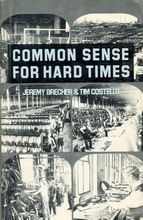
Common Sense for Hard Times
The Power of the Powerless to Cope with Everyday life and Transform Society in The Nineteen Seventies
Brecher, Jeremy; Costello, Tim
Publisher: Two Continents Publishing, New York, USA
Year Published: 1976
Pages: 277pp ISBN: 0-8467-0175-8
Library of Congress Number: HD8072.B724 Dewey: 301.4442
Resource Type: Book
Cx Number: CX7361
Presents a vision of society as it is and as it could be. Putting the problems of contemporary daily life in historical perspective, it reveals that they have their roots in the way our society is organized, and thereby enables us to re-examine our own situation and experience.
Abstract:
The life of our society is based on the cooperative labor of the great majority who do the work; it is controlled by the small minority of owners, managers, businessmen, politicians and bureaucrats for whom they work. For most people, every aspect of daily life is shaped by the power of the dominant majority. What you experience at work, what you have available to meet your needs at home, the very environment in which you live -- all depends upon the chaotic interaction of the decisions made by the rich and powerful.
When things go smoothly, when the ways to achieve a good life seem evident, most people see this control as something to accept, not something to challenge. But when, as now, people's needs go unmet, when the future looks bleak, when the power of that minority promises nothing but misery, insecurity and endless labor, then it is time to put an end to the system of minority control.
The means to do so are at hand. Our society is created by what working people do in their daily life. Corporations would crumble, governments collapse and armies disintegrate if those who activity made them up simply refused to continue the behavior that maintains them. If the majority took control of their own activity, they would have the power to shape this activity as they choose, and thereby shape society. This reality gives ordinary people, who often appear so powerless, a great potential power. What is necessary to end minority rule is for the majority to use that power.
Table of Contents:
Preface
Introduction
Part I: Working
The Time Of Your Life
How Did We Ever End Up Here?
The Structure of Work
Resistance on the Job
The Union
The Big Picture: The Big Rip-off
Part II: Living
Hard Times
Environment: Natural and Social
Part III: The Working Class
Blue Collar
White Collar
From Slave to Worker
Women and Work
The Shared Experience
Part IV: Action
Direction Cooperation among People to Meet Their Own Needs
Unification of Different Groups' Struggles
People's Control of Their Own Organizations
Equality Within The Working Class
Democratization of Knowledge and Thought
Mutual Control of All Productive Activity
A farewell: No Dress before the Iron
A Note On The Interviews
Notes
Bibliography
Index
Subject Headings


